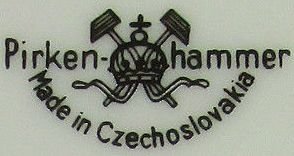


Pirkenhammer, a renowned porcelain manufactory, was founded in 1803 by Friedrich Höcke and Johann Gottlob List in Karlovy Vary, Bohemia (now Březová, Czech Republic). Initially operating under the name "Friedrich Höcke," the factory underwent a significant transformation in 1811 when it was acquired by Johann Martin Fischer and Christopher Reichenbach. The name was then changed to "Fischer & Reichenbach," and in 1822, they obtained a license to produce porcelain.
By the 1820s, Pirkenhammer gained a reputation as the finest porcelain manufacturer in Bohemia, earning accolades such as a gold medal at the 1839 Vienna World Fair for its exquisite craftsmanship, including its clear body, smooth glaze, and quality painting. The factory continued to achieve recognition at various international exhibitions, including the 1857 World Exhibition in London and the 1878 Paris exhibition, where it won a silver medal. Throughout the 19th century, Pirkenhammer produced high-quality tableware, vases, lamps, and decorative items, often featuring floral patterns like the Ilmenau straw flower.
After Martin Fischer’s death in 1824, his widow Sophie Friederike took over the management until their son Christian Fischer assumed control in 1831. Under his leadership, Pirkenhammer became known for its mastery of gilding, which was formally recognized as safe in 1835. The company also distinguished itself through the influence of designer André Carriére, who became chief designer in 1868 and helped shape Pirkenhammer's style into the late 19th century.
In 1945, following the nationalization of Czech porcelain factories by the communist government, Pirkenhammer became known as Starorolský Porcelán and later Karlovarský Porcelán. It shifted its focus to research and development.
In 2006, Russian designer Alexey Narovlyansky was invited to revitalize the brand, and under his guidance, Pirkenhammer launched a new line of high-tech porcelain products. Today, Pirkenhammer operates as Manufaktura Pirkenhammer I.S., with its signature mark of crossed hammers, continuing its legacy of fine porcelain craftsmanship.